|
| |
This week in:
IPSI | Africa | Americas | East Asia | Europe & Central Asia | Middle East | South Asia
|
|
|
|
| |
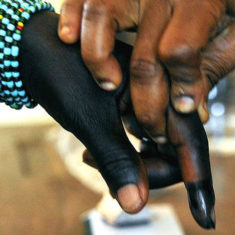
IPSI Intensive: Electoral Security: Analytical Frameworks, Planning, and Administration
Washington, DC
January 11-12, 2018
|
|
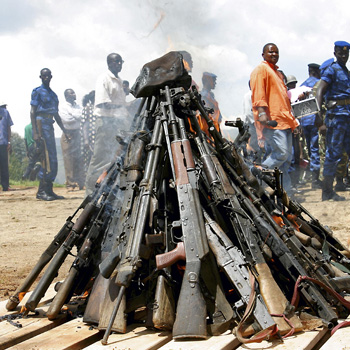
PSI Intensive: Reintegrating Former Fighters, DDR in an Era of Countering Violent Extremism
Washington, DC
January 19-20, 2018
|

IPSI Intensive: The Virtuous Cycle: Building Resilient Governance Systems
Washington, DC
January 27, 2018
|
|
|
|
|
|
| |
This week in Sub-Saharan Africa
|
|
|
|
| |
DEMOCRATIC REPUBLIC OF CONGO: Rebels kill UN peacekeepers
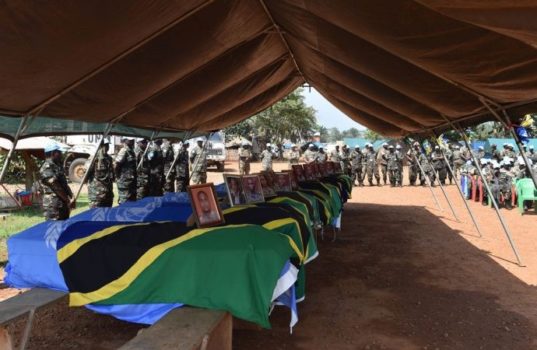
|
|
Last Thursday, suspected Ugandan rebels killed at least 20 UN peacekeepers and wounded more than 50 in a raid on a base in the town of Semuliki in North Kivu’s Beni territory in the Democratic Republic of Congo (DRC); three additional peacekeepers are still missing. UN officials suspect that militants from the Allied Democratic Forces (ADF) – an Islamist rebel group active in the area – staged the assault. The UN Security Council condemned the attack the following day and held a moment of silence for the victims. Established in 2010, MONUSCO has suffered 93 fatalities of military, police, and civilian personnel. Nearly 300 peacekeepers have been killed In DR Congo since the initial mission in 1999. Comment: Increased militia activity in the east and center of the county has added to a sense of insecurity this year amid political tension linked to President Joseph Kabila’s refusal to step down when his mandate expired last December. An election to replace Kabila, who has ruled Congo since his father’s assassination in 2001, has repeatedly been delayed and is now scheduled for December 2018. (Africa news, Reuters, Aljazeera, CNN, UN News Centre, Voice of America)
|
|
|
|
|
| |
SOMALIA: Suicide bomber kills at least 18 at police academy in the capital
| |
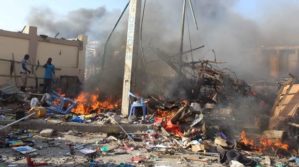
|
On Thursday, a suicide bomber disguised as a policeman blew himself up inside a police training camp in the capital of Mogadishu killing at least 18 officers and injuring more than 15 others. The police were preparing for the 74th anniversary of Police Day. The militant Islamist group al-Shabaab claimed responsibility for the attack, but placed a higher death toll at 27. The attack came at a time when the African Union is finalizing plans to trim its peacekeeping mission (AMISOM). The 22,000-strong AU force is scheduled to evacuate by 2020. Security experts have raised concerns that al-Shabaab could find it easier to stage attacks in the expected security vacuum as the government forces will have difficulty replicating the AU Force. Comment: al-Shabaab, which is allied to al-Qaeda, is waging an insurgency against the UN-backed government and its African Union allies in a bid to topple the weak administration and impose its own strict interpretation of Islam. ( Reuters, BBC, News24, Aljazeera)
|
|
|
|
|
| |
ZIMBABWE: Illegal settlers ordered to vacate farms
On Wednesday, the country’s new Minister of Agriculture ordered illegal occupiers of farms to vacate the land immediately, a move that could ultimately see the return of farms to white farmers displaced under former President Robert Mugabe’s regime. Land is an emotive issue in the country after the violent invasion of white-owned farms in 2000 by supporters of former president Mugabe, who defended the seizures as a necessary redress of colonial-era imbalances. Only those with documentation of land occupancy and/or those who were allocated land legally will be allowed to remain on the farms. This is the first signs of the post-Mugabe government making good on promises to respect agricultural property rights. Comment: White farmers have previously complained that politically connected people used state security agents to force them off their farms, sometimes even when they were in the middle of harvesting. President Emmerson Mnangagwa, who replaced 93-year old Mugabe as leader last month, promised to stabilize the economy, including agriculture and the creation of jobs. (Reuters, The Herald, Zimbabwe News)
Researched/Written by Brian Adienge
|
|
|
|
|
| |
This week in the Americas & Caribbean
|
|
|
|
| |
ECUADOR: Vice President faces jail time for Odebrecht case
On Wednesday, an Ecuadorean court sentenced Vice President Jorge Glas to six years in prison for his role in the scandal with the Brazilian construction company, Odebrecht. Prosecutors accused Glas of pocketing USD 13.5 million through familial connections to the organization. Glas’ lawyer stated that the politician plans to appeal the decision. Comment: Glas, along with other Ecuadorean officials, orchestrated a deal with Odebrecht to receive bribes in exchange for the company to receive contracts. (ABC News, Reuters, BBC News)
|
|
|
|
|
| |
UNITED STATES: Pipe bomb explodes in New York City subway station
On Monday, Bangladeshi-American Akayed Ullah carried out a self-proclaimed Islamic State-inspired bombing in the Port Authority Bus Terminal in Manhattan, New York City. Authorities have noted that the bombing was an isolated terrorist attack attempt, and that Ullah has pledged his allegiance to ISIS. Ullah stated that he acted out in response to Israeli actions in Gaza. Comment: U.S. Attorney Joon Kim stated that Ullah picked the location in Manhattan to maximize potential fatal casualties. (CNN News, ABC News, BBC News, The Guardian)
|
|
|
|
|
| |
UNITED STATES: UN expert says torture continues at Guantanamo Bay
On Wednesday, UN Special Rapporteur on Torture, Nils Melzer, stated that the use of torture continues at the U.S.-led Guantanamo Bay prison in Cuba, despite the prison being banned by both the U.S. and international law. Melzer states that there is evidence of Ammar al-Baluchi, an alleged co-conspirator of the 9/11 attacks, continues to be tortured at the prison. Pentagon spokesperson, Major Ben Sakrisson, stated that these alleged accusations are false. Comment: The U.S. has been criticized by various countries and organizations for its “legal black hole” that allows for the infinite detention of suspects. (Newsweek, Reuters, USA Today, The Hill)
Researched/Written by Blessing Ikpa
|
|
|
|
|
| |
This week in East Asia & Pacific
|
|
|
|
| |
CHINA: Officials collect biometric data from Xinjiang residents as part of a free health program
On Tuesday, Human Rights Watch revealed that Chinese authorities are collecting biometric information from every resident aged between 12 and 65 in Xinjiang, a northwestern region inhabited by over 10 million Uyghurs and other Muslim minorities. Residents are asked to provide DNA samples, blood types, fingerprints and iris scans. The former two biometrics are collected through a free annual physical exam program called “Physicals for All.” Police officers then link the data to the individual’s national identification number. Human Rights organizations say that it is not clear whether patients are informed about the collection and whether they can opt out. They warn the data collection violates the individuals’ rights to privacy, dignity, and physical integrity. Comment: Though official Chinese media stresses participation for the “physicals” should be voluntary, some international news sources have argued that the government pressures people to participate. Previous government efforts only required passport applicants in Xinjiang to supply biometrics. (Human Rights Watch, CNN, Reuters, The Guardian)
|
|
|
|
|
| |
CHINA: Protests against migrant evictions display rare public dissent
| |
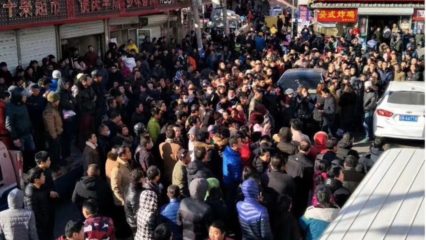
|
On Sunday, hundreds of demonstrators took to the street in a rare protest in Feijia village, 12 miles northeast of Tiananmen Square, to speak out against forced migrant evictions. After an apartment block fire killed 19 people last month, Beijing began a 40-day citywide demolition campaign to remove fire hazards, which left tens of thousands of migrant workers with only hours to leave their homes before they were demolished. The protesters shouted and carried banners with chants such as “forced evictions violate human rights.” China’s official Communist press did not report on the protests, although videos and photos of the public unrest spread online. Comment: The migrants are poorly paid workers typically from rural China who moved to Beijing and are often dubbed as the “low-end population” by officials. The China Labour Bulletin estimates there are 282 million rural migrant workers in China, one-third of the nation’s working population. (China Labour Bulletin, South China Morning Post, New York Times, TIME, The Guardian)
|
|
|
|
|
| |
PHILIPPINES: Congress approves year-long extension of martial law
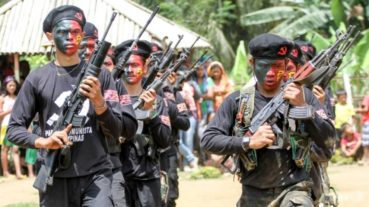
|
|
On Wednesday, Philippines’ Congress approved Duterte’s request to extend martial law in the southern region of Mindanao for one year in order to contain the spread of self-proclaimed ISIS-aligned militant groups. The decision passed the House of Representatives with 226 in favor and 23 objections and the Senate with 14 in favor and four against. Human rights group Karaptan said in a statement “This is a dangerous precedent that inches the entire country closer to a nationwide declaration of martial rule.” Comment: Martial law was initially imposed in May for a 60-day period in accordance to the constitution. In July, it was extended by five months, set to end December 31, although the constitution does not have any provisions on extension of martial law. Duterte announced Marawi’s liberation in October, but his officials continue to warn against a regrouping of self-proclaimed ISIS militants. (Channel News Asia, Washington Post, Al Jazeera, Reuters)
Researched/Written by Rabia Uddin
|
|
|
|
|
| |
This week in Europe & Central Asia
|
|
|
|
| |
AUSTRIA / ITALY: Gas explosion outside Vienna puts Italy at risk for energy shortages
On Tuesday, an explosion at the Baumgarten gas hub outside of Vienna killed one, injured 18, and disrupted energy distribution for most of southern Europe. Italy, a major crossroads for gas pipelines to western Europe, declared an immediate state of emergency as gas prices increased rapidly. The wholesale day-ahead price on Tuesday in Italy reached a record high at EUR 47 per megawatt hour; this was a 97 percent increase. This price increase also impacted other areas in Europe, with Britain, Europe’s biggest gas market, seeing prices rise 35 percent. Comment: The cause of the explosion is still unclear and is under investigation. The Austrians reported the explosion’s cause as a technical problem, but Gas Connect Austria’s chief Harald Stindl has said that it may have been caused by new equipment. (The Local AT, The Guardian, Reuters)
|
|
|
|
|
| |
RUSSIA: Putin declares victory over the Islamic State in Syria
On Monday, Russian President Vladimir Putin made a surprise visit to Syria to declare victory against the Islamic State and to announce the partial withdraw of troops from the country. Russian forces had been fighting the Islamic State and rebel groups in the country since September 2015 and assisted the Assad regime in its attempt to reclaim control. Putin did not rule out reengagement in Syria, stating that if the Islamic State began to resurge, Russia “will strike them with a force that they have never previously seen.” Comment: Putin’s visit to Syria was his first stop on a one-day, three-country diplomatic trip. He also visited and met with leaders in Egypt and Turkey to discuss the state of conflict in the Middle East. (The Moscow Times, Aljazeera, The Guardian, Reuters)
|
|
|
|
|
| |
REGIONAL: European Union complicit in human rights abuses in Libya, according to Amnesty International
On Tuesday, Amnesty International released a report, ‘Libya’s dark web of collusion,’ in which it claims the European Union (EU) and individual European countries, specifically Italy, are knowingly complicit in the torture and exploitation of migrants and refugees in Libya. The report alleges that the EU tolerates widespread abuses at the hands of the Libyan Coast Guard, detention center authorities, and smugglers. Accusations include arbitrary detention, torture, forced labor, extortion, and unlawful killings. It is estimated that over 20,000 people are currently being held in Libyan detention centered funded by the EU. Comment: EU representatives have not officially commented on this report, but European leaders have been speaking out in regards to the desperate state of conditions for refugees and migrants in Libya. Last month French President Emmanuel Macron called for “concrete military and policing action on the ground to dismantle [migrant abuse] networks” in Africa, and the UK Independent Commission for Aid Impact called into question the UK’s role in Libyan Coast Guide programs in March. (Libya Observer, EuroNews, The Guardian, Amnesty International)
Researched/Written by Amy Pipher
|
|
|
|
|
| |
This week in the Middle East & North Africa
|
|
|
|
| |
IRAQ: Prime Minister Haider al-Abadi declared a formal victory over the self-proclaimed Islamic State (IS)
On Saturday, Iraqi forces wrested the last few areas still controlled by IS along its western border with Syria, marking the end of its three-year war against the militants. On Sunday, Abadi delivered a speech in Baghdad’s heavily-fortified Green Zone, declaring December 10 a national holiday, and presided over a military parade. In his speech, Abadi omitted to mention the Kurdish Peshmerga fighters, who played a large role in the fight against IS. Rather, he praised the Iranian-backed Popular Mobilization Forces (PMF), whose eventual disarmament is seen as Abadi’s biggest threat following IS’s defeat. U.S. State Department spokeswoman Heather Nauert released an official statement congratulating Iraq following Abadi’s speech, but added that the “fight against terrorism, and even against [IS]” is not over. Comment: At its height, IS controlled Iraq’s northern and western provinces, including Mosul, its second largest city. Military and security officials warn that the Islamic State (IS) will return to its guerrilla roots, and that coalition fighters should expect a new phase of guerrilla warfare. Hours before Abadi’s speech, a bomb suspected of being planted by insurgents exploded in the center of Tikrit, the hometown of former President Saddam Hussein and a hotbed of anti-government activity. (Al Jazeera, New York Times, AP 1, 2, Reuters)
|
|
|
|
|
| |
ISRAEL: Israel retaliates against Hamas after a dozen rocket attacks this week
On Wednesday afternoon, Israel’s Iron Dome Missile Defense System intercepted two missiles fired from the Gaza Strip. The move comes after Israel confirmed it struck a Hamas military compound earlier that morning in response to another rocket fired into Israeli territory on Tuesday. At least 13 rockets were fired from Gaza at Israel since U.S President Donald Trump’s recognition of Jerusalem as Israel’s capital, of which eight exploded in Israeli territory. At least three rockets exploded within the Gaza Strip, one of which resulted in the deaths of two Palestinians. Israeli intelligence attributes the majority of the rockets to extremist factions operating beyond Hamas control. Comment: This is the largest number of rockets fired at Israel since the end of Operation Protective Edge, the war that Israel fought with Hamas and its allies during the summer of 2014. (Haaretz 1, 2, Al Jazeera, AP)
|
|
|
|
|
| |
REGIONAL: Turkey hosts emergency OIC summit to oppose U.S. recognition of Jerusalem
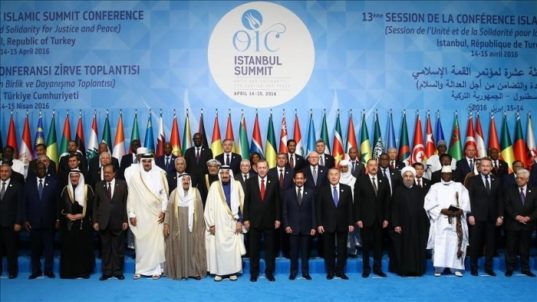
|
|
On Wednesday, Turkish President Recep Tayyip Erdogan called for an emergency summit of The Organisation of Islamic Cooperation (OIC) to Istanbul in response U.S. President Donald Trump’s decision to recognize Jerusalem as the capital of Israel. In their communique, the OIC declared the recognition as unlawful under international law and consider its decision as a sign of U.S. withdrawal from its role as a primary sponsor and mediator of peace in the region. The 57-member organization, with a surprise visit by a Venezuelan delegation headed by President Nicolas Maduro, also “declare East Jerusalem as the capital of the State of Palestine, and invite all countries to recognize the State of Palestine and East Jerusalem as its occupied capital.” Israeli Prime Minister Benjamin Netanyahu rejected the OIC communique, stating, “In the end, the truth will win, and many countries will recognize Jerusalem as the capital of Israel and will also move their embassies.” Comment: Last week, U.S. President Donald Trump released a press statement that the United States officially recognizes Jerusalem as the capital of the State of Israel and plans to relocate the U.S. embassy from its current location in Tel Aviv to an as yet undetermined location in Jerusalem. Despite Secretary of State Rex Tillerson’s statement that the move does not reflect Jerusalem’s final status in an eventual peace agreement between Israel and Palestinians, the move received widespread international condemnation as disruptive and counterproductive. (Organisation of Islamic Cooperation, Ya Libnan, AP, Al Jazeera, BBC, CNN, Reuters, VOA)
Researched/Written by Zachary Libow
|
|
|
|
|
| |
BANGLADESH: Anti-diphtheria campaign begins in Rohingya camps after nine deaths and 700 infections
| |
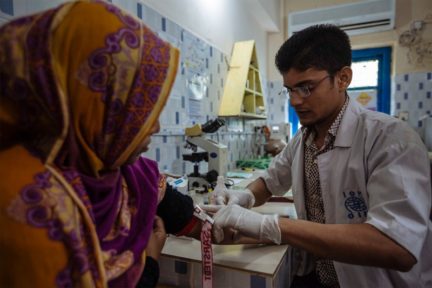
|
On Tuesday, Bangladesh launched a massive campaign to vaccinate Rohingya children in refugee camps against diphtheria after nine refugees died and more than 700 were reported to be infected. The campaign will initially target all children between six weeks and six years-old in 12 camps and temporary settlements along the Myanmar border. Next week, three rounds of vaccines will be provided to children aged 7 to 15 years-old, as well as to health and development workers. The vaccinations will protect against diphtheria, pertussis, tetanus, the flu, hepatitis B, and polio, and are supported by UNICEF, the World Health Organization, the Vaccine Alliance GAVI, and the UN Migration Agency. Comment: Diphtheria is a highly contagious infectious respiratory disease that disproportionately affects children, especially in areas with overcrowding, poor sanitation and lack of immunization. When untreated, diphtheria has a 50 percent mortality rate in children. (Dhaka Tribune, Channel News Asia, ReliefWeb, IOM)
|
|
|
|
|
| |
NEPAL: Communist alliance to win big in landmark election
On Tuesday, Nepal’s Election Commission released preliminary results of last week’s parliamentary election, projecting that the coalition between the Communist Party of Nepal Unified Marxist Leninist (CPN-UML) party and the Communist Party of Nepal Maoist Centre (CPN-MC) party will form the new government of Nepal by mid-January. The CPN-UML and CPN-MC alliance won 113 national parliament seats, while the ruling Nepali Congress party won 21. Former Nepali prime minister and current leader of the CPN-UML. K.P. Oli, will likely be the next prime minister. Comment: This election is the first to take place since Nepal’s new constitution was adopted in 2015. Full results from Nepal’s parliamentary and provincial assembly elections are expected by early January. The Nepali Congress is widely considered to be pro-Indian, while the communist alliance is seen to be closely aligned with China. (The Himalayan Times, NDTV, DW, Reuters)
|
|
|
|
| |
PAKISTAN: More than 300 separatist militants surrender arms as part of political reconciliation
On Saturday, more than 300 separatists laid down their arms at a public ceremony in Balochistan hosted by the government and security forces. The ceremony is part of ongoing reconciliation efforts by the Pakistani government to end a decade-long insurgency in the province, which shares borders with Afghanistan and Iran. In exchange for the militant’s surrendering their weapons, the government has offered amnesty and financial rewards, as well as aiding in their re-integration into society. Comment: Militants in Balochistan have been linked to both domestic and foreign terrorist groups. Pakistani government officials say that more than 2,000 militants have surrendered in the last year and a half. (Pakistan Today, The Dawn, Reuters)
Researched/Written by Natalie A. Landau
|
|
|
|
|